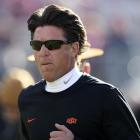College football facilities are quiet, pads are not popping and the future of the 2020 season remains in limbo as the world deals with the coronavirus pandemic. Oklahoma State coach Mike Gundy is seemingly not as concerned as many others. He's looking forward to returning to work and has a date in mind.
The Cowboys coach told reporters on Tuesday that he's hoping to get back to coaching sooner than later as long as an antibodies test is developed that can clear people of the virus or prove that they are immune.
"How fast that can happen based on the tests that are available, I can't say right now, but that's the plan," Gundy said, according to ESPN. "We have to have a plan, and the plan right now is for them to start on May 1. It might get backed up two weeks. I don't know. I can't make that call, but if it does, we'll start with the employees of this company, the ones that come in this building. Then we'll bring the players in, and slowly but surely we'll test them all in."
Stillwater, Oklahoma, currently has a shelter-in-place order through April 16, which could be extended based on the infection curve in the state and around the country. Gundy said that his plan to get back to football on May 1 is fluid based on how the infection progresses over the next month.
"Maybe they don't come back," he said, "but the majority of people in this building who are healthy ... and certainly the 18-, 19-, 20-, 21-, 22-year-olds that are healthy, the so-called medical people saying the herd of healthy people that have the antibodies may be built up and can fight this? We all need to go back to work.
"I'm not taking away from the danger of people getting sick," he said. "You have the virus, stay healthy, try to do what we can to help people that are sick. And we're losing lives, which is just terrible. The second part of it is that we still have to schedule and continue to move forward as life goes on and help those people."
Gundy also claimed that the COVID-19 pandemic -- which has cost more than 81,000 deaths worldwide, including more than 12,000 in the United States -- would be treated very similar to the standard flu once a test and treatment are developed.
"We get people that get the flu during the season. We quarantine them, we treat them, we make sure they're healthy, we bring 'em back," he said. "It would be the same thing here, but at some point, we've got to go back to work. We've got to get these guys back in here. ... From what I read, the healthy people can fight this; the antibodies make it better. They're doing some blood transplants now with the people that have already gotten the disease, that have gotten over it that have the antibodies that can fight it. There's a lot of people who can figure this out. May 1's our goal. Don't know if it will happen. Players will come in after that."
Oklahoma State released a statement on Gundy's comments on Tuesday night.
"Everyone wants to return to some degree of normalcy as soon as possible." the statement read. "As for Oklahoma State University, we will adhere to the advice of public health experts who are making informed decisions in the best interest of the citizens of our nation and state based on sound scientific data. We will also abide by the federal and state mandates as well as Big 12 guidelines. We will not compromise the health and well-being of our campus community. This virus is deadly and we will do our part at Oklahoma State to help blunt the spread."
Of course, comparing a novel virus that developed over the last five months, doesn't have a vaccine and has spread all over the world in a short period of time to the flu -- which, while also deadly, has a time-tested vaccine -- seemingly ignores the severity of the current pandemic. What's even more surprising is that Gundy seemingly disregards the threat it poses to young people as long as players can get back to the business of football.
There have been more than 1.4 million coronavirus cases and more than 80,000 deaths worldwide since the pandemic started in late 2019. College and professional sports have essentially been put on hold during the fight against COVID-19.

















